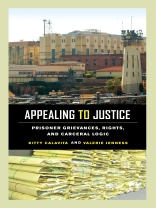Having gained unique access to California prisoners and corrections officials and to thousands of prisoners’ written grievances and institutional responses, Kitty Calavita and Valerie Jenness take us inside one of the most significant, yet largely invisible, institutions in the United States. Drawing on sometimes startlingly candid interviews with prisoners and prison staff, as well as on official records, the authors walk us through the byzantine grievance process, which begins with prisoners filing claims and ends after four levels of review, with corrections officials usually denying requests for remedies. Appealing to Justice is both an unprecedented study of disputing in an extremely asymmetrical setting and a rare glimpse of daily life inside this most closed of institutions. Quoting extensively from their interviews with prisoners and officials, the authors give voice to those who are almost never heard from. These voices unsettle conventional wisdoms within the sociological literature—for example, about the reluctance of vulnerable and/or stigmatized populations to name injuries and file claims, and about the relentlessly adversarial subjectivities of prisoners and correctional officials—and they do so with striking poignancy. Ultimately, Appealing to Justice reveals a system fraught with impediments and dilemmas, which delivers neither justice, nor efficiency, nor constitutional conditions of confinement.
Tabela de Conteúdo
List of Tables
Acknowledgments
1. Introduction: Rights, Captivity, and Disputing behind Bars
2. ‘Needles, ‘ ‘Haystacks, ‘ and ‘Dead Watchdogs’: The Prison Litigation Reform Act and the Inmate Grievance System in California
3. Naming, Blaming, and Claiming in an Uncommon Place of Law
4. Prisoners’ Counternarratives: ‘This Is a Prison and It’s Not Disneyland’
5. ‘Narcissists, ‘ ‘Liars, ‘ Process, and Paper: The Dilemmas and Solutions of Grievance Handlers
6. Administrative Consistency, Downstream Consequences, and ‘Knuckleheads’
7. Grievance Narratives as Frames of Meaning, Profiles of Power
8. Conclusion
Appendix A: Procedures for Interviews with Prisoners
Appendix B: Procedures for Interviews with CDCR Personnel
Appendix C: Coding the Sample of Grievances
Cases
Notes
References
Index
Sobre o autor
Kitty Calavita is Professor Emerita of Criminology, Law and Society and of Sociology at UC Irvine. Her books include Invitation to Law and Society: An Introduction to the Study of Real Law; Immigrants at the Margins: Law, Race, and Exclusion in Southern Europe; Big Money Crime: Fraud and Politics in the Savings and Loan Crisis; and Inside the State: The Bracero Program, Immigration, and the INS.Valerie Jenness is Professor of Criminology, Law and Society and of Sociology at UC Irvine, where she is also Dean of the School of Social Ecology. Her books include Making Hate a Crime: From Social Movement to Law Enforcement Practice; Hate Crimes: New Social Movements and the Politics of Violence; Making It Work: The Prostitutes’ Rights Movement in Perspective; and Routing the Opposition: Social Movements, Public Policy, and Democracy.












